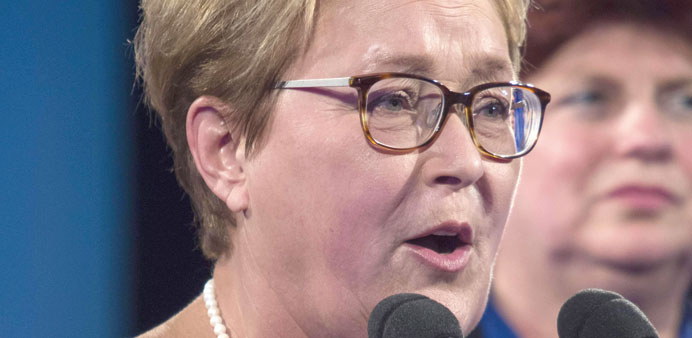AFP/Montreal
Canada’s Quebec province voted out a separatist government on Monday, choosing a former neurosurgeon and his federalist Liberal party to lead a promised economic rally.
Television networks predicted a Liberal victory soon after the polls closed.
Preliminary results at 10pm (0200 GMT yesterday) showed Philippe Couillard’s Liberals in the lead with 34% of votes cast, followed by the separatist Parti Quebecois (PQ) with 22%.
The conservative Coalition Avenir Quebec and the leftist Quebec Solidaire rounded up 21% and 6% support, respectively.
Quebec’s first female premier, PQ leader Pauline Marois, also lost her seat in the contest, and resigned her post with the PQ.
Marois had called the snap elections 18 months into her first mandate, hoping to gain seats to form a majority government.
The main opposition Liberals’ new leader was untested and its usual economic platform was in shambles.
But what at first looked like a sure win for the PQ quickly turned round during one of the nastiest campaigns in Canadian history, with the Liberals jumping into the lead in the final stretch.
In order to form a majority government, a party needed to win at least 63 of the 125 seats in the Quebec legislature.
At 10pm (0200 GMT), the Liberals had won or were leading in 70 electoral districts, up 21 seats from before the election, while the PQ was at 30.
“All of Quebec has won by choosing a stable government,” Couillard, 56, said in a victory speech. “Henceforth Quebec’s priorities are the economy and jobs. It has chosen unity and (a policy of) openness.”
“As premier of Quebec, I will lead a thriving and the only majority francophone society in North America,” he said, pledging to fight for “Quebec’s interests, and its attachment to the Canadian federation.”
Marois had kicked off the campaign pitching a secular values charter, which would ban public sector workers from wearing religious apparel, including headscarves, turbans and yarmulkes.
But the fight for the province’s 6mn voters suddenly turned to focus on whether a majority PQ government would hold a third referendum on Quebec independence in the next four years.
Quebecers rejected splitting from the rest of Canada in 1980 and 1995 referendums. And recent polling shows two out of three Quebecers do not want to reopen the thorny debate.
During the campaign, Couillard, warned of economic and social turmoil should a majority PQ government bent on Quebec independence win.
At the same time, he touted his party as best to spur a sluggish Quebec economy that has trailed other Canadian provinces in emerging from the Great Recession.
Canadian Prime Minister Stephen Harper said: “The (election) results clearly demonstrate that Quebecers have rejected the idea of a referendum and want a government that will be focused on the economy and job creation.”

Pauline Marois announces her retirement after she lost her seat in front of her supporters at the Parti Quu00e9bu00e9cois rally in Montreal.
